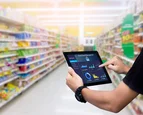The retail world is in a thrilling state of transformation, where innovative ideas to offer exceptional shopping experiences are continuously being explored. From AI-driven personal assistants to predictive customer support and ingenious delivery options, it’s all about seamless, personalised experiences that keep customers coming back for more. In the near future, autonomous stores will automate the entire shopping journey, while new delivery and pickup options will provide unmatched convenience. The power of AI is at the heart of all of these exciting changes. As the retail sector continues to evolve, retailers must embrace new technologies to stay ahead of the game. Let’s have a closer look at some of these exciting developments.
Reshaping retail: the customer experience
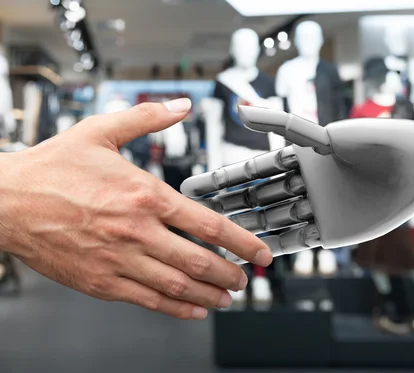
From AI chatbots providing hyper-personalised recommendations to drones enabling increasingly seamless delivery options, new innovations in retail will continue to transform the customer experience in the years ahead.
AI-powered personal shopping
With the advent of AI-powered personal shopping, the retail industry can offer customers a more personalised and hassle-free shopping experience than ever before. From recommending products that match their taste to predicting their needs before they even realise them, AI-powered personal shopping assistants are changing the face of retail.
Take Google’s Shopping Graph for instance. Using machine learning, this tool has real-time access to over 35 billion product listings and searches through product descriptions, reviews, images, and videos to help you find exactly what you need. Shopping Graph is also a learning tool that can recognise desirable product qualities faster with every search, making it more efficient the more you use it.
Another example is YesPlz's GPT AI Stylist, which is like having your own personal shopping assistant that has a solution for your every style predicament. Simply ask: "Show me professional tops for next week’s board meeting" and the AI provides matching products tailored to your unique needs. YesPlz also offers clickable product images, styling suggestions, and other visual information relevant to your prompt. Its recommendations are always accurate and detailed, with a sense of style that elevates your looks to the next level.
Even luxury secondhand shopping is now a whole lot smarter, thanks to Maia, the brand new chatbot from the AI startup Sociate. Powered by generative AI technology, Maia offers personalised suggestions based on trends and events. Maia is multimodal, so it can both see and speak to gain a deeper understanding of what you're after. Whether you're looking to dress like a 90s fashionista or seeking inspiration from your favourite influencer's Instagram, Maia’s got you covered.
The autonomous, cashierless store
Autonomous, cashierless stores provide customers with convenient and efficient shopping experiences and offer businesses benefits like optimised inventory management and reduced labour costs. Through a combination of advanced sensors and AI-powered algorithms, autonomous stores track customers and their movements and ensure that everything is restocked as needed. Customers can simply walk in and pick up what they need, while payment transactions happen in the background.
Microsoft recently partnered with autonomous shopping tech startup AiFi to launch the Smart Store Analytics platform for cashierless stores. It features state-of-the-art cameras that track customers’ every move. As soon as they're ready to check out, payment is automatically charged to their cards. The system also pulls data from the AiFi platform to deliver insights for optimising store layouts and inventory. It shows how customers interact with products and how they move through the aisles. It also converts foot traffic into a heat map and tracks what each customer spends on average.
ALDI Nord, in partnership with computer vision company Trigo, recently opened the first AI-powered supermarket in Utrecht, the Netherlands. The cutting-edge store measures 370m² and is equipped with high-tech shelf sensors and ceiling-mounted cameras that analyse customers’ movements and product choices. That means you can simply grab what you need and walk out without having to scan any items or stand in a checkout line. And payments are completed digitally. Trigo's computer vision system can identify and price all kinds of items, from baked goods to freshly squeezed fruit juices — even weighted items like meat and fresh produce.
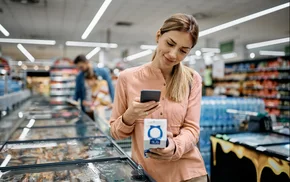
Redesigning customer engagement and service
Retailers are increasingly embracing proactive and predictive service; anticipating customer needs before they arise. Smart AI algorithms allow customers to tailor their shopping experiences to their individual preferences, while AI chatbots can greatly enhance the customer experience. This enables retailers to build stronger customer relationships and increase customer loyalty.
One example of a company that uses AI to improve customer support and engagement is H&M. The fashion retailer has implemented an AI-powered chatbot feature within its mobile app and website. The H&M Assistant’s natural language processing (NLP) technology enables it to understand customer enquiries and provide personalised recommendations. Customers can ask the chatbot about sizing, fit, and styling options, and it will respond with relevant product suggestions.
The e-commerce beauty retailer Glossier also uses AI to enhance the customer experience and provide personalised recommendations. Glossier's AI algorithms analyse customer behaviour, search history, and purchase patterns to offer tailored product suggestions and improve the overall shopping experience. The company also uses AI to overcome client service challenges. At some point, a significant number of customers exchanged a particular shade of lipstick for a lighter shade of the same product. To prevent this issue from recurring, Glossier improved the colour-matching feature on its website. Using data analysis and AI-powered insights, Glossier was able to take proactive measures to improve the customer experience and reduce returns-related costs.
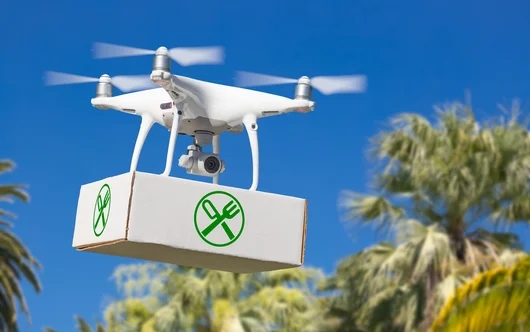
Innovative and personalised pickup and delivery options
From drone deliveries to curbside and in-store pickup, retailers are offering more innovative and personalised solutions than ever before. These options not only provide customers with a convenient and efficient shopping experience, but they also showcase the advancements of technology and its impact on the retail industry.
Take the Panasonic Smartlockers, for instance. Already popular in Australia, these chilled and frozen automated food lockers offer a fast, secure, and contactless delivery and pickup option. They are designed to keep food fresh and are set to become an increasingly familiar sight across Europe as well. The locker system has a user-friendly interface and is designed with a robust security system, including tamper-proof locks and real-time monitoring. To collect their items from the Smartlocker, customers receive a unique access code via text or email.
Even drones are used to boost customer convenience. Silicon Valley logistics startup Zipline, for instance, recently revealed its latest innovation, the P2 delivery drone system, which can dock and recharge itself. The system comprises a ‘base drone’ and smaller delivery drones that drop off packages. The delivery drone can identify its landing spot, drop the package, and quickly return to the base drone. Zipline is even developing a prototype that can lower packages from a high-flying mother drone to a doorstep using a retractable tether line. The P2 drone system eliminates package theft and enables ten deliveries in ten minutes.
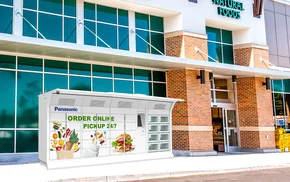
How to get started: important first steps to new retail services
To stay ahead in the competitive world of retail, businesses must constantly innovate. By brainstorming new ideas, retailers can differentiate themselves from the competition and offer unique services to their customers. It's also essential to understand what is possible locally and seek guidance from experienced individuals to elevate service quality. This way, businesses can take their first steps towards implementing new retail services, upgrading their customer service levels, and staying ahead in the game. Studying your competitors can offer valuable insights into their success strategies and highlight areas for improvement in your own business. Another important factor to consider is that innovation cannot happen without effective leadership and management.
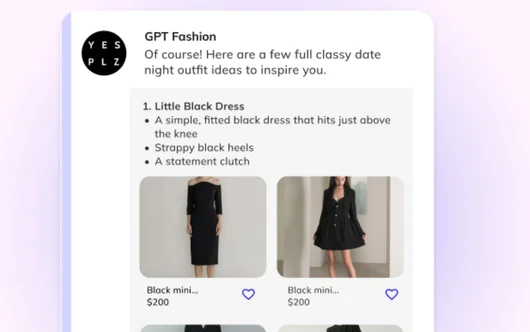
In closing
In the years ahead, we can expect even more innovations to transform the customer experience. From hyper-personalised recommendations to increasingly seamless delivery options, the possibilities are endless. As a result, customers can expect new retail services that cater to their unique needs and preferences. Considering what’s coming next, there’s lots to be excited about as ongoing technological advancements continue to revolutionise the retail industry and enhance our lives in countless ways.


